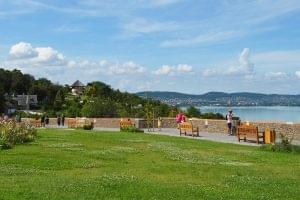Natural disaster or human challenge? – The water of Lake Balaton is getting warmer
Lake Balaton is no longer the same lake we knew even two decades ago. According to a recent study by the HUN-REN Balaton Limnological Research Institute, the water temperature has risen by an average of 1.7 degrees Celsius over the past 25 years – and this change is not only affecting our summer swimming, but is transforming the entire ecological system of the lake.
Slow start, accelerating warming
 While the temperature increase was barely noticeable from the end of the 19th century to the 1980s, the pace has accelerated significantly by the 21st century. Currently, an average increase of 0.07 degrees is measured annually, and in winter it is even more: 0.21 degrees. This seemingly small change is a much greater burden for nature than for humans.
While the temperature increase was barely noticeable from the end of the 19th century to the 1980s, the pace has accelerated significantly by the 21st century. Currently, an average increase of 0.07 degrees is measured annually, and in winter it is even more: 0.21 degrees. This seemingly small change is a much greater burden for nature than for humans.
Underwater Heat Waves
One of the most visible consequences of climate change is the increase in the number of water temperature heat waves. While they were rare in the 1990s, today there can be up to 100 such days per year, when the water of Lake Balaton is permanently warmer than what was measured on 10 percent of the warmest days on record. During such periods, the water can exceed the climate norm by up to 6 degrees.
Algal blooms, oxygen deficiency, evaporation – ecological domino effect
Warming not only brings a feeling of heat, but also changes: evaporation from the water increases, oxygen deficiency conditions develop more often, and the release of nutrients from the sediment accelerates. The latter favors algal blooms – as we could see spectacularly in the summer of 2019 – and causes increasing eutrophication, meaning the lake becomes more nourished, which upsets the balance of wildlife.
Changing flora, new arrivals
Lower water levels and higher temperatures favor reed and seaweed plants, but at the same time they also give room for the appearance of new, invasive species. Common kelp has been naturalized in the western basin since 1998, and the warm outlet water of Lake Hévíz allows additional, heat-loving species to settle in the lake.
In water that warms above 30 degrees, the competition is increasingly won by species that are able to adapt to an oxygen-poor environment – such as pond kelp or large kelp. This may not only worry ecologists, but also vacationers: these seaweed plants can make bathing unpleasant.
Related news
The Balaton House of the Year awards were presented
🎧 Hallgasd a cikket: Lejátszás Szünet Folytatás Leállítás Nyelv: Auto…
Read more >Related news
Festival buzz at the 60th anniversary EuroShop trade fair
🎧 Hallgasd a cikket: Lejátszás Szünet Folytatás Leállítás Nyelv: Auto…
Read more >Historic price reduction at ALDI
🎧 Hallgasd a cikket: Lejátszás Szünet Folytatás Leállítás Nyelv: Auto…
Read more >A stable compass in the Hungarian FMCG sector for 20 years
🎧 Hallgasd a cikket: Lejátszás Szünet Folytatás Leállítás Nyelv: Auto…
Read more >








